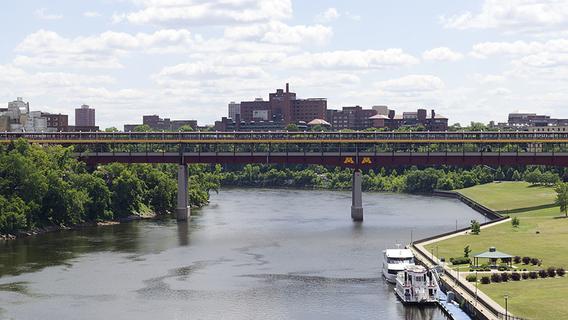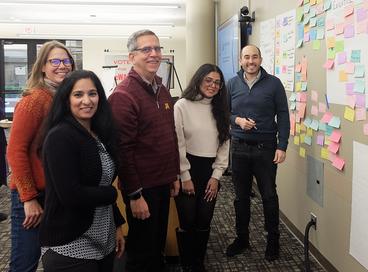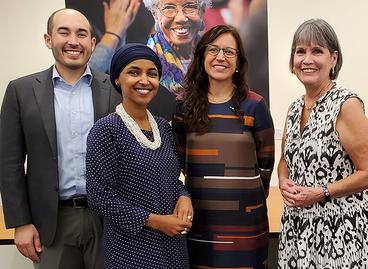
Historic. Transformational. Unprecedented. These are just a few words being used to describe the federal government’s recent commitments to fund the clean energy transition, environmental cleanup, and climate change endeavors across the country.
The $430 billion investment, through the Inflation Reduction Act of 2022 and the Bipartisan Infrastructure Law of 2021, is “huge,” said Associate Professor Bonnie Keeler, an environmental policy expert at the Humphrey School of Public Affairs. And it comes at a time when we see regular reminders of the urgency of tackling the climate crisis.
“This funding represents the largest investment in clean energy in our nation's history, and the most significant climate policy action of any administration, ever,” Keeler said. “Our country, and hopefully our world, will look different in the future because of these kinds of investments. The urgency, importance, and potential of this opportunity can’t be overstated.”
There’s a special focus on making sure that underserved communities receive the bulk of the support from these new programs.
Keeler and colleagues at the University of Minnesota have a key role to play in getting that federal funding into the hands of local entities that will actually carry out much of the work. The University was recently chosen to lead one of the 17 Environmental Justice Thriving Communities Technical Assistance Centers (TCTACs) being established across the country.
Keeler and Humphrey School Associate Professor Gabe Chan are co-leading the Great Lakes TCTAC (pronounced TICK-tack), along with University Extension Associate Dean Stephen Jeanetta. The center, which is launching with a $10 million grant from the Environmental Protection Agency and the Department of Energy, is a sprawling endeavor involving universities, tribal organizations, and nonprofits in six states: Minnesota, Wisconsin, Illinois, Indiana, Michigan, and Ohio.
'Paperwork favors the powerful'

Good policy and lots of money aren’t enough to address the long-standing environmental inequities that are experienced by communities of color, tribal nations, and those living in poverty, Keeler said.
“We have a responsibility to underserved communities,” she said. “Unless we disrupt the dynamics where paperwork favors the powerful, these investments and programs may only reinforce inequality instead of leading to lasting change in the communities who have historically been left out of our environment and energy economy, or directly harmed.”
To that end, the TCTAC program is aligned with the Biden Administration’s Justice40 Initiative, which ensures that 40 percent of the benefits of certain federal investments flow to disadvantaged communities.
About two dozen representatives from all the Great Lakes TCTAC partners met in person for the first time last week at the Humphrey School, to begin organizing the work they need to do to support underserved communities—for example, identifying which of the partners can best provide budget-writing support, training in grant writing, translation services, and project analysis and evaluation.
The goal is to have a network of TCTAC liaisons in every county in each of the six states involved in the project, to raise awareness and begin building local relationships.
Key services
First and foremost, the partner organizations pledge to engage community and nonprofit leaders to gain their trust, and help them determine their areas of greatest need.
“This means letting communities identify their priorities and then leveraging our networks, expertise, and technical know-how to break down the barriers that stand in the way,” Keeler said. “It is more than just connecting communities to resources. It’s helping them dream bigger, be strategic, develop long-term skills and training that will affect their success over years and decades.”

It’s essential to match the appropriate grant opportunities to each individual organization, based on their priorities and their size, said Keeler. For example, many nonprofits are too small to handle a grant of $10 million or more.
The aforementioned paperwork is a real issue. The federal government has written a number of guidebooks to assist groups in applying for grants, but some are quite long—200 pages or more. Communities need someone they trust to summarize that information for them based on their individual needs, and TCTAC partners will provide that support.
And then there are the grant applications themselves, which often require significant documentation—such as budgets, maps, statistics, engineering specifications, legal language—and even more when the grant is awarded.
The TCTAC partners will help organizations navigate grant requests, develop budget scenarios, manage their projects, and evaluate the outcomes. They will also provide training for groups to manage these processes on their own in the future.
Various organizations have already sent in grant proposals and inquiries since the project was first announced in April. So the TCTAC team is ramping up the application and tracking process, as well as communications, planning, training, and myriad other logistical elements, in hopes of "opening for business" in the next couple of months.
A good fit with the Humphrey School
Keeler and Chan are co-directors of the Humphrey School’s Center for Science, Technology, and Environmental Policy (CSTEP), which emphasizes community engagement and collaboration on energy and environmental policy.
TCTAC “echoes those principles,” said Humphrey School Dean Nisha Botchwey. “Issues of climate change, environmental justice, and sustainability are not mere abstractions for us. They are priorities that resonate deeply with our own students, alumni, faculty, and staff—and truly go beyond this School.”
“The Humphrey School’s reputation is built on our mission to prepare leaders to change the world,” Keeler added. “We focus on action-oriented work to address the problems affecting our society, locally and globally, and our work with TCTAC is a logical extension of that.”
The TCTAC program is funded for the next five years, and Keeler hopes that it leads to “long-term transformative work” that meaningfully addresses climate change and environmental justice.
“Our success will be measured by the degree to which we materially improve the lives of remote, rural, and disadvantaged communities in the region," she said, "and build capacity for the kind of sustained advocacy and policy action that we’ll need, beyond the life of the Inflation Reduction Act and the current administration.”
Learn more: Great Lakes Environmental Justice Thriving Communities Technical Assistance Center

